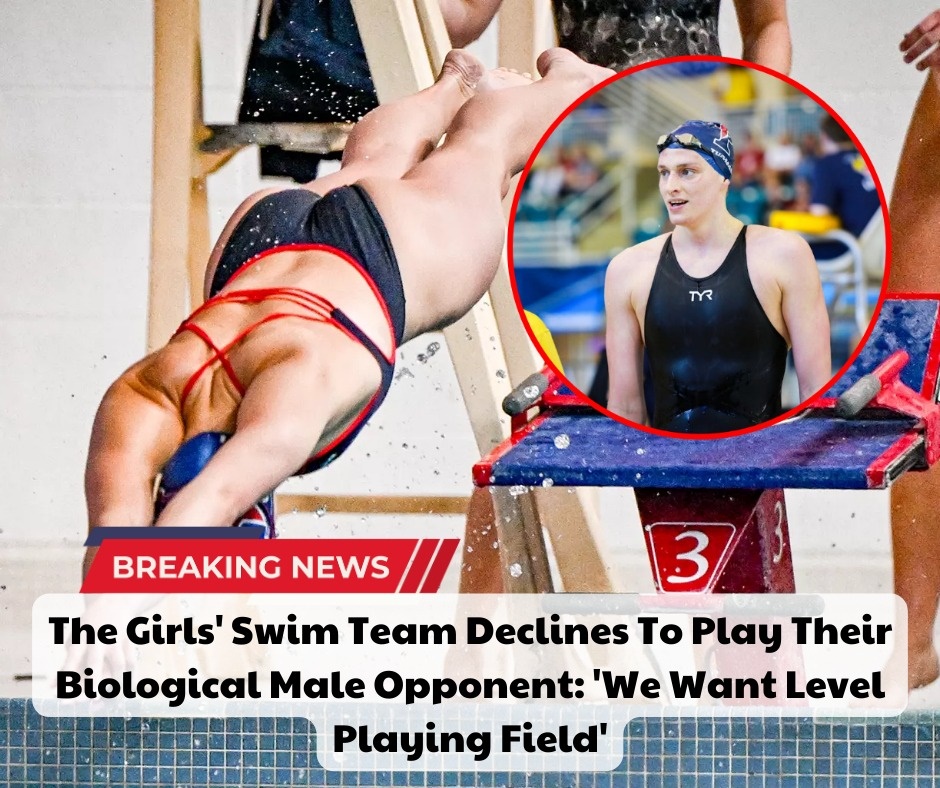In a bold and controversial move, a high school girls’ swim team has decided not to compete against a biological male opponent, stating that their decision is rooted in a desire for fairness and a level playing field in competitive sports. The incident has ignited a heated debate over the balance between inclusivity and fairness in athletics.
Background of the Decision
The girls’ swim team, from an undisclosed high school, announced their decision ahead of a scheduled competition where they were set to race against a swimmer who was born male but identifies as female. The team’s spokesperson cited concerns over the physical advantages that biological males may have over female competitors in strength-based sports.
“We believe in fair competition and the integrity of women’s sports,” the team’s captain stated. “It’s not about discrimination; it’s about ensuring that all athletes compete on an even field.”
The Broader Debate: Inclusivity vs. Fairness
The decision by the girls’ swim team comes amid ongoing national discussions about the participation of transgender athletes in sports. Advocates for transgender rights argue that everyone should have the opportunity to compete in the gender category with which they identify, highlighting the importance of inclusivity and the mental health benefits of sports participation. Conversely, opponents of this view contend that biological differences can create inherent advantages that compromise the fairness of competition. They argue that allowing transgender women (biological males) to compete in female sports categories can undermine the achievements of cisgender female athletes and skew competitive balance.
Reactions and Opinions

The team’s decision has sparked a wide range of reactions from the community and beyond. Supporters commend the girls for standing up for what they believe is fair competition. They argue that allowing biological males to compete in female sports could set a precedent that erodes the purpose of having gender-specific categories.
“These girls are brave for taking a stand on a sensitive issue,” said one parent. “It’s crucial to have a fair and level playing field in sports, and they have every right to voice their concerns.” On the other hand, critics argue that the decision reinforces harmful stereotypes and discriminates against transgender athletes.
They emphasize the importance of inclusion and the right for all individuals to compete in sports, regardless of their gender identity. “Excluding athletes based on their gender identity is a form of discrimination,” said an LGBTQ+ rights advocate. “Sports should be a place where everyone feels welcome and valued, and these girls should reconsider the broader impact of their decision.”
Legal and Ethical Implications
The decision by the girls’ swim team also brings to light the complex legal and ethical questions surrounding the participation of transgender athletes. Many sports organizations are grappling with how to create policies that balance fairness with inclusivity. The issue is further complicated by varying state laws and regulations, which can differ significantly on the rights of transgender individuals in sports.
Some states have enacted laws that restrict transgender athletes from competing in categories that align with their gender identity, while others have implemented more inclusive policies. The lack of uniformity in regulations adds to the complexity of the issue and the challenges faced by schools, athletes, and sports organizations.
Moving Forward
As the debate continues, the decision by the girls’ swim team serves as a microcosm of the broader societal conversation about gender identity, fairness, and inclusivity in sports. The incident highlights the need for thoughtful dialogue and the development of policies that can fairly address the concerns of all stakeholders.

For the girls’ swim team, the focus now shifts to finding ways to advocate for fairness while promoting a respectful and inclusive environment for all athletes. Their stand is likely to inspire similar discussions in other sports and schools, as communities across the country grapple with these important and complex issues.
In the end, the goal is to ensure that sports remain a place where all athletes can compete, excel, and be celebrated for their achievements, while upholding the principles of fairness and equality that are central to the spirit of competition.











